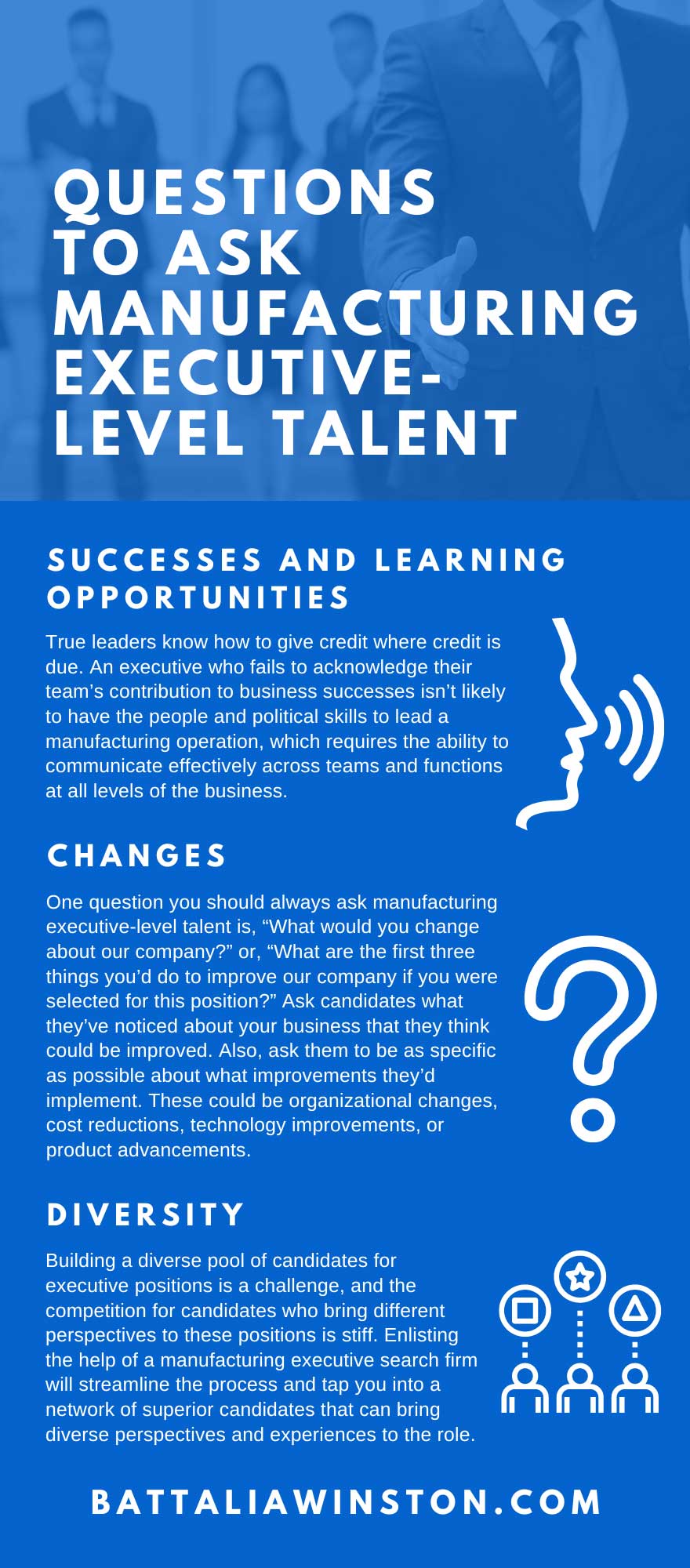Manufacturing faced unprecedented challenges in the early 2020s. Pandemic-related supply chain issues made obtaining raw materials and parts exceedingly difficult and costly. Manufacturers learned the hard way the risks of just-in-time processes and offshore supplies.
As the industry begins to recover, businesses may need new leadership in manufacturing, from operations and logistics to marketing.. Learn questions to ask manufacturing executive-level talent.
Successes and Learning Opportunities
True leaders know how to give credit where credit is due. An executive who fails to acknowledge their team’s contribution to business successes isn’t likely to have the people and political skills to lead a manufacturing operation, which requires the ability to communicate effectively across teams and functions at all levels of the business.
Similarly, an executive who doesn’t acknowledge failures should raise red flags about integrity. After all, how can you trust a person who can’t name a single time they failed to tell you the truth when something goes wrong?
A talented manufacturing executive will be able to describe not only the fact of a failure in the past, but also how they learned from the experience. What could they have done to prevent the problem? What did they do to fix it? And how would they avoid similar issues in the future?
Changes
One question you should always ask manufacturing executive-level talent is, “What would you change about our company?” or, “What are the first three things you’d do to improve our company if you were selected for this position?” Ask candidates what they’ve noticed about your business that they think could be improved. Also, ask them to be as specific as possible about what improvements they’d implement. These could be organizational changes, cost reductions, technology improvements, or product advancements.
Asking a candidate about what they’d change, add, or improve at your company will tell you if they’ve done their homework about your business, their knowledge of your industry, and their leadership and communication style. For instance, do they answer tactfully yet directly, or are they disdainful or evasive?
At the executive level, candidates should have been given briefing materials describing your business’ organization and structure, current financials, and even plans for growth (with appropriate safeguards for confidentiality, of course). If they can’t respond convincingly with some insights about improving your business, they didn’t prepare appropriately for the interview, which doesn’t bode well for success in an executive role.
Diversity
It’s simply a proven fact that businesses with diverse workforces are more successful. Ask executive-level manufacturing candidates about their past efforts to diversify a workforce, establish DEI policies and activities, and how they measure results.
Building a diverse pool of candidates for executive positions is a challenge, and the competition for candidates who bring different perspectives to these positions is stiff. Enlisting the help of a manufacturing executive search firmwill streamline the process and tap you into a network of superior candidates that can bring diverse perspectives and experiences to the role.
Omissions
Ask executive-level candidates about what’s not on their résumé. Probe to require a candidate to fill in gaps in employment, reasons for multiple job changes, and lateral moves. Also, give the candidate a chance to tell you something that’s not listed that they think you should know.
It’s a squirmy question; a talented leader will take it head on, answer briefly and directly, and readily offer something that gives you a better sense of who they are and what’s important to them both in their career and their life outside of work.
Criticism
“Tell me about a time when a supervisor, colleague, or board member criticized you directly. How did you respond?” This question is one any C-suite level candidate should be able to answer calmly. Board relationships and communication with other senior executives will always involve disagreements—and criticism comes with the territory. Candidates should be able to describe how they defuse conflict, what compromises they are willing to make, and where they draw a line and stand their ground in the face of criticism.
Pressure
C-suite candidates will have had careers that are long and varied enough to have faced many tough decisions. They will have gone through reorganizations, layoffs, difficult choices among suppliers, site selection, relocations, and community relations. Ask candidates to describe their most difficult decisions and the effects they had on the company, its workers, and their own position.
A great manufacturing executive will always think about the impact of their decisions on front-line workers, consumers, and their company, beyond profitability to legal compliance, brand image, and the human impact on workers and their families. Executives make tough decisions all the time; delay, evasion, or delegation (where an executive makes difficult decisions someone else’s problem) signals that a candidate isn’t ready for a C-suite role.
Communication
Ask candidates how they communicate good and bad news to all stakeholders. Do they explain how they modify their messaging in tone and content depending on their audience? Do they acknowledge that listening is just as important as talking? Present prompts such as, “Describe a few times when you communicated good news and bad news, both internally and externally, at your past positions.” If the candidate doesn’t explain who the audience was for the communication, ask them to elaborate.
Globalization
Even small businesses have global relationships, whether with suppliers or customers. In the 21st century, it’s a rare business that maintains a strictly local profile. Simply having a website exposes you to a global audience. Ask executive-level manufacturing talent about their global experiences and what adjustments they’ve made or would make to appeal to an global audience.
Large companies with an established global presence will want to know how an executive models appropriate cultural sensitivity when dealing with customers, suppliers, and business partners from countries other than their own.
Ask candidates about their travels and what they have learned about relating to a diverse international audience. You’ll get a better sense of a candidate’s flexibility and adaptability, which are important factors that drive continuous improvements in manufacturing. Perhaps even more importantly, cultural sensitivity can help break bottlenecks in supply chains, repair misunderstandings, and avoid time-wasting snafus in communications.
Leadership Matters
In just the first few years of the 2020s, manufacturers have encountered unprecedented challenges. Companies that weathered the storm and recovered rapidly did so with outstanding leadership and despite weak or inept executives. When hiring executive manufacturing talent for your company, you should select a leader who can inspire confidence and trust across the company, lead change, make tough decisions, and tell the truth about missteps and disappointing results.



